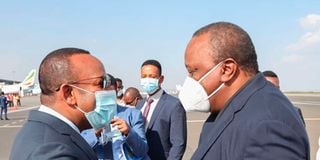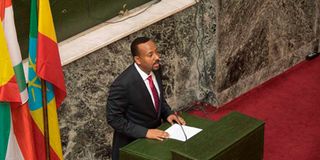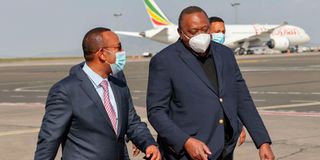ETHIOPIAN DIPLOMAT: PM ABIY AHMED ‘MISQUOTED’ ON KENYA EMBASSY CLOSURE
July 6, 2021

President Uhuru Kenyatta and Ethiopian Prime Minister Abiy Ahmed are pictured at Bole International Airport in Addis Ababa on June 8, 2021.PSCU
By Aggrey Mutambo & Tesfa-Alem Tekle
The Ethiopian ambassador to Kenya now says Prime Minister Abiy Ahmed was being hypothetical when he said the embassy in Kenya was among those to be shut down to save costs.
Meles Alem Tekea said the mission in Kenya will not be closed, in line with his country’s foreign policy on regional integration.
“The Prime Minister was being hypothetical. The truth is that the embassy will not be closed. It is a very clear policy that our neighbours are priority in our foreign policy,” he told the Nation on phone on Tuesday.
Later, the embassy sent a statement terming the report that the mission in Kenya was among those to be closed as “false and wild guess”.
“The Nairobi mission will not be closed. Ethiopia’s neighbouring countries such as Kenya remains a priority to the Ethiopian foreign policy.”

In this file photo taken on April 2, 2018 Abiy Ahmed, newly elected Prime Minister of Ethiopia, addresses the house of Parliament in Addis Ababa, after the swearing in ceremony. Zacharias Abubeker | Pool | AFP
What PM said
In a briefing to Ethiopian lawmakers on Monday, PM Abiy said Ethiopia will shut down several embassies to manage costs and have most diplomats work as non-resident ambassadors to their countries of accreditation.
He did use Kenya as an example, suggesting diplomats accredited to Nairobi could make field visits to Kenya instead of being resident.
“Ethiopia shouldn’t have 60 or so embassies and consulates in the present moment. Instead of throwing US dollars everywhere … at least 30 of the embassies should be closed … the ambassadors should instead be here,” he said.
He added: “The Ethiopian ambassador in Kenya, for example, probably meets the Kenyan foreign minister once a year or once in two years.”
The actual list of embassies to be closed was no disclosed and Abiy suggested the policy will be implemented once his Prosperity Party settles in after winning elections.
This, he told legislators, was part of his reforms in foreign policy to save costs in running missions abroad.
“With the current situation Ethiopia is in, the country doesn’t need to have as many as 60 or so embassies and consulates,” he said.
Instead of hiring drivers, Abiy said, government ministers will be required to drive themselves.
“What we want is a person who gets wet in the mud and runs while reforming the country,” he said.

People carry flags for Tigray’s pre-war government (left) and the Tigray People’s Liberation Front (right) as well as a portrait of its pre-war President, Debretsion Gebremichael, as captive Ethiopian soldiers walk towards Mekelle Rehabilitation Center in Mekelle, the capital of Tigray region, Ethiopia, on July 2, 2021. Yasuyoshi Chiba | AFP
Resources stretched
The move came just a week after Ethiopia admitted resources were stretched, especially after the war in Tigray in which Ethiopian forces had been pursuing the Tigray People’s Liberation Front (TPLF), once a ruling party but now considered a terrorist group.
Last week, Addis Ababa admitted it had lost some $2.3 billion in infrastructure damage in Tigray, even as the TPLF paraded thousands of captured Ethiopian soldiers following a unilateral ceasefire by Addis Ababa.
Abiy said the withdrawal of the country’s defence forces from Tigray was the right decision.
He explained that among reasons for the government’s decision were economic and Covid-19 pressures.
“We have national projects to complete” he told MPs at Monday’s session where the House has also approved a draft budget of 561.7 billion birr ($12.83 billion) for the upcoming Ethiopian fiscal budget year.”

President Uhuru Kenyatta and Ethiopian Prime Minister Abiy Ahmed are pictured at Bole International Airport in Addis Ababa on June 8, 2021.PSCU
Oldest mission in Kenya
The Ethiopian embassy in Kenya is oldest African diplomatic mission in Kenya, having been set up initially as a consulate with colonial Kenya in the early 50s before formally opening a full embassy just as Kenya was getting its self-rule.
Ethiopia’s diplomatic number plates in Nairobi are listed CD 3, showing it was the third country in the world to establish diplomatic relations with an independent Kenya.
Built near State House, the Seat of the Presidency in Nairobi, the mission was erected on land donated to Emperor Haile Selasie of Ethiopia by Kenya’s first President Jomo Kenyatta. The two countries signed a mutual defence cooperation agreement a few years later, the oldest of such deals by Kenya.
Yet it is not entirely a new idea.
A few months after taking power in April 2018, PM Abiy suggested to the world that countries in the Horn could share out diplomatic roles across the world to save on costs, and push a common agenda to the world.
“There is no need to have a foreign Embassy in Switzerland for each of East African countries. We can share because we are poor,” he told the World Economic Forum in Davos in January 2019.
“We have to allocate that resources to change the lives of our society. We are working towards integration of the region.”
Abiy whose rallying call has been Medemer, Amharic for synergy or pooling together, has argued Ethiopia’s reform platform banks on a vibrant democracy, economic vitality and regional integration and openness to the world.
“There is no need to have different armies in Ethiopia Eritrea, Djibouti … I don’t believe in this.”
‘Internal affair’
Fast forward to 2021, realities in the region and local politics may have cancelled out the idea of a common pool of diplomats.
But the financial cost ensured Abiy has to cut to half the number of embassies across the world.
So what if he closes the iconic Kenyan mission, which also handles Ethiopia’s relations with the Comoros and Malawi?
An official at the Ministry of Foreign Affairs in Kenya told the Nation Kenya will stay out of whatever Ethiopia decides as it is an internal affair, but added that relations with Addis Ababa are as cordial as before.
Some analysts, though, saw the move as a reflection of relations in the Horn.
“The effect would be tantamount to severing relations with Kenya,” Dr Ahmed Hashi, an analyst of the Horn of Africa
“I think it is really the worst time for Kenya-Ethiopia relations and it is all about differences in Somalia,” Hashi told the Nation on Monday, reflecting on the two countries’ policies in Somalia.
Soon after Abiy came to power, he abandoned Ethiopia’s Meles-era policy in Somalia, where Addis worked more with federal states than the centre. He would later sign a pact with President Mohamed Farmaajo to develop four ports in Somalia.
That move, analysts argue, ran counter to what Kenya’s stance has been, for example by working with federal states to provide a security buffer to Nairobi.
“It is an earth-shattering development as far as the Horn of Africa’s regional geopolitics is concerned. The two nations’ ties built on a weak Somalia fell apart,” added Dr Abdiwahab Sheikh Abdisamad, a Kenyan Horn of Africa consultant and author on Ethiopia’s political history.
“Abiy’s Ethiopia decided to jettison anti-Somali policies, while Kenya is stuck in its 1960s. Choices have consequences,” he added bluntly.
Cost cutting measures are plausible, he added, but considering that Ethiopia will not be closing embassies in some countries where it has numerous consulates, the actual reasons may be deeper, he argued.
“They probably prefer another country to Kenya and will curtail the Tigray network in Nairobi,” he said referring to the TPLF, which Ethiopia wants to annihilate.
Source: Nation




